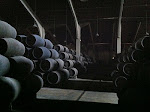Wine Retail is like Egg Sushi, and so is Champagne. But Burgundy isn't.
I once heard a story about sushi that really impressed me. The true sushi expert, when trying a restaurant for the first time, always begins by ordering Tamago, or egg sushi. Egg sushi may not be as exciting as sea urchin (Uni) or fatty tuna belly (Toro), but it is through tasting this basic dish, this omelet made by rolling many thin layers of seasoned egg batter, that the sushi expert can predict whether or not the sushi chef's seafood dishes will be worthwhile.
I was reminded of this story the other day while doing my work shift in the basement of the food coop, cutting and packaging cheese. There was a discussion about restaurants and a Swiss woman asked which local places had the best house wine. She meant exactly that - house wine, unlabeled wine in a carafe. I had been minding my own business, using a wire to cut a block of Comte, but my ears perked up at this. "Why are you interested in house wine," I asked.
"Where I come from," she said, "you can tell if a restaurant carries good wine by tasting their house wine. They select it carefully, and it's supposed to tell you about their ability to find good wine, as well as about their personal taste in wine."
Hmm. I like that idea, but I don't think things work that way here. There may be places offering good house wines, but I don't think that the American wine lover goes to a restaurant and uses house wine as a litmus test, the way the Sushi expert might with Tamago.
This got me thinking about wine stores. A good shop has several good wines available at the $12 price point. There isn't a lot of good wine available for $12 in the NYC market, but all of my favorite retailers offer something interesting and delicious for small money. They didn't become my favorite retailers based on this, but they do have this in common. I wonder, the next time I'm traveling or in a store that's new to me, if I begin by examining the $12 and under wines, will I be able to predict whether or not the store as a whole is any good?
The Tamago story also got me thinking about Champagne and Burgundy. Does a great Bourgogne mean that the producer's higher level wines are great? Does a great non-vintage Champagne mean the producer's vintage wines and the special cuvées are also great? In Champagne many producers are careful to craft excellent entry-level wines because they understand that most consumers will never taste their better wines - their reputations can be built entirely on their basic cuvée. Regarding Champagne, I think that it is reasonable to make predictions about a producer based on the quality of their most basic wine. I want Billiot's, Boulard's, and Bouchard's basic wines as much as I want their top wines.
Although it is true that most people will never taste the top Burgundy wines, I don't think it is practical to make predictions this way in Burgundy. Reputations there are built on the caliber of the top wines from the top vineyards, and Bourgogne can be an afterthought. Many of the best producers, like DRC, Roumier, Mugnier, or Dujac don't even make Bourgogne. I'm not sure that it would be good strategy to make predictions about a producer based on Bourgogne, or whatever the basic wine is. Yes, there are great producers who make great Bourgogne - Lafarge and Mugneret-Gibourg, to name two. But as I think about it, most of the Bourgogne I drink (Lignier-Michelot, Voillot, Sylvie Esmonin, Leclerc) most often does not come from the producers whose top wines I want to splurge on, and with the exception of Mugneret-Gibourg, I don't buy Bourgogne from the producers whose top wines I buy. Is this because I'm buying the wrong Bourgogne, or because in Burgundy the predictive relationships are far more complicated? I wish there were Burgundian version of Tamago.







14 comments:
You know, I can't recall the last restaurant I visited that served a "house" wine. Racking, racking brain - nothing coming up.
But, with rare exceptions, house wine in the US is quite poor. (Like I need to tell anyone this!) This differs from Europe, of course, where you can and do get enjoyable house wines...usually at small places that care about the food as well.
To your later main questions; judging a wine store...
I look at the quality of the producers in general...if not good or mostly unknown (which is now unusual with me), it is not a good sign that their inexpensive wines will be any good.
Btw, the best indicator of an inexpensive wine being good is the Importer. (Again, most reading this already know that.)
I guess what this basically shows, is that if a person cares as much as his top as his lowest tier stuff, then he must care. Like A big wine critic in Vancouver told one of the newer critics that he always orders soup of the day or the house soup to Judge a restaurant. If a Chef can't even season his house soup or make it taste good then really how much does he care about the rest of the product.
Is there a producer who makes a great Grand Cru that also makes a lackluster Bourgogne? The producers you mention here simply don't make one.
I like Esmonin's Clos St. Jacques and have liked Voillot also, though not enough to pay the 2005 prices.
What about Ghislaine Barthod, no Grand Cru, but her premier cru wines are better than many producers' grand cru, but her bourgogne is wonderful.
I actually like to judge a restaurant's wine program based on what champagne they serve by the glass (and at what price). Anyone with Pommery, Mumm, Moet, or Veuve Cliquot as the champagne by the glass for anything over $12 pretty much immediately gets extricated from my list of good wine restaurants.
As a wine buyer for a restaurant, I find this idea intriguing. It's true, most restaurants don't serve a "house wine" as in unnamed red/white from a jug, but the cheapest glass-pour is a decent analog.
I tend to spend a lot of time selecting the cheapest red and white glass pour for a very simple reason - it's what the staff drinks! I also try to get the best $30 bottles I can for the list. I think being able to order a bottle with your dinner is an important part of the dining experience.
As for champagne, well that's difficult. Champagne, at least in my market is quite expensive. We always pour something from a grower rather than a large house, but the cost to the customer is high. Even with a high glass price, we still make very little on champagne glass pour.
@ Cliff - There are top producers that make iconic wines, and who also make Bourgogne - Cathiard, Barthod, Lafarge, Coche, Chevillon to name some. I have yet to be blown away, particularly since they also charge a premium for their Bourgogne based on their name. Sadams62 suggests Barthod's is worth it, the jury is still out for me. i should try the 2006. But it is $35, and I can buy better wine for that $, no matter how good of a Bourgogne Barthod's is. Once we're upwards of $25 I mostly just don't feel like paying. If Fourrier made a Bourgogne I would probably buy it. I buy Mugneret-Gibourg's. If Chandon de Briailles made one I would buy it. I like Bize's Bourgogne.
@Gene - i agree, except I would say that regardless of price, if those are the only by the glass Champs on offer.
Elwood - i suspect your wine list is interesting, based on what you're saying, and that kind of attention to the inexpensive stuff pays off. It means that everyone can drink good wine. Not sure I understand why you aren't making money pouring a glass of Champs, unless there is waste. For example, if a bottle of NV Pierre Peters costs you about $35, and you sell 4 glasses at $15 each, you're doing fine, right? Is my math way off?
I've liked Barthod's Bourgogne well enough, but it's a pretty useless category as far as I'm concerned. I'd rather drink Puffeney's Poulsard, and legions of wines like it, for the price -- in many cases, leaving price aside.
I must agree with Cliff. I've tasted Barthod's '06 Bourgogne, and while it was pleasant enough it tasted severely out of whack, even after an hour. I've had similar experiences with the basic wines from Lignier-Michelot and others. I haven't tasted the Mugneret, but in general the very appealing notion of buying into a great producer's wines at the ground floor doesn't seem to work in Burgundy. At $35, I'd rather buy Huet or Thevenet or Gonon.
I agree - if I spend $35 I want the best wine I can buy for that money, which I have to say, is rarely red Burgundy. Sometimes you suck it up and buy because I want to drink Burgundy more often, but as you both said, there are other wines at that price point that represent the best examples of their kind.
if we are talking about price for bourgogne than Barthods is definitely more expensive. We were discussing I thought who made grande cru level wine as well as a good bourgogne. However the quality is good.
If we are taklking about a producer who makes a wonderful bourgogne from the 2006 vintage I suggest Marechal's Cuvee Gravel, and Humbert Freres Bourgogne both around $26 and fantastic. The Freres 1er Cru Gevrey stuff is amazing with elegance and purity.
In the last six months, I've gone through nearly a case of Rapet's '06 Pernand-Vergelesses, a pure, balanced pinot that costs $24 at Chambers Street Wines, and a few bottles of their '06 premier-cru Beaune—Les Greve and Les Bressandes—both serious, delicious burgundies that cost just over $40. Rapet doesn't have nearly the reputation, or holdings, of Ghislaine Barthod, yet for the money Rapet is the hands-down winner, at least in '06. But then, burgundy on a budget is inevitably a heartbreaking pursuit—my chances of tasting Barthod's more serious wines are slim.
I would take Lafouge in any vintage over Barthod's Bourgogne as well.
Sorry for my pedantry, but Roumier actually does make a (ridiculously good) Bourgogne, albeit in tiny quantities... I had a 2001 last year that was just beautiful.
I know it's apples and oranges, but in the $25-30 range I would nearly always prefer a great cru Beaujolais to a Bourgogne Rouge--even one from a great producer. What Bourgogne Rouge can give the complexity and pleasure of a Foillard Cote du Py, or a Chermette Moulin-a-Vent, or a Thevenet VV?
Post a Comment